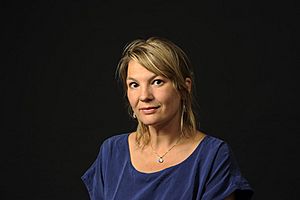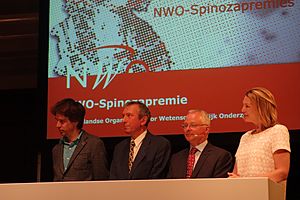Eveline Crone facts for kids
Quick facts for kids
Eveline Crone
|
|
|---|---|
 |
|
| Born | October 23, 1975 |
| Nationality | Dutch |
| Alma mater | University of Amsterdam (M.A., Ph.D.) |
| Children | 2 |
| Awards | Spinoza Prize (2017) |
| Scientific career | |
| Fields | Developmental psychology |
| Institutions | |
| Thesis | Performance monitoring and decision-making: Psychophysiological and developmental analyses (2003) |
| Doctoral advisor | Maurits van der Molen |
Eveline Crone, born on October 23, 1975, is a Dutch professor. She studies how the brain develops in teenagers. Her work focuses on why young people take risks during puberty. She also looks at what good can come from these risks. For her important research, she received the Spinoza Prize in 2017. This is a very high award for scientists in the Netherlands.
Contents
Eveline Crone's Journey
Early Life and Education
Eveline Crone was born in Schiedam, Netherlands. When she was in high school, she became very curious about people. She wanted to understand why they act the way they do. This led her to study psychology.
After high school, she went to the University of Pittsburgh in the United States. This was from 1997 to 1998. There, she saw the first studies using brain scans on young children. This made her very interested in brain research.
In 1999, she earned her master's degree. She studied developmental psychology at the University of Amsterdam. She continued her studies there and earned her doctorate in 2003. Her special project was about how people make decisions. She then worked for two years at the University of California, Davis.
Building a Career in Brain Research
In 2005, Professor Crone started working at Leiden University. She began as an assistant professor. By 2009, she became a full professor. She taught about how the brain develops in teenagers. She also worked at the University of Amsterdam until 2014.
At Leiden University, she started the Brain and Development laboratory in 2005. This lab helps us understand how teenagers' brains work. Their research helps schools and society better support young people.
Understanding Teen Brains
Why Teenagers Take Risks
Professor Crone's main research looks at risky behaviors in teenagers. She wants to understand why these risks happen. She also explores what purpose they serve. She uses special brain scanning tools, like functional magnetic resonance imaging, to see how teen brains work.
She believes that being a teenager is a "useful development phase." It's a time when the brain learns to deal with a bigger social world. She doesn't see it as just a difficult time.
Impact on Society
Her work has even helped change laws in the Netherlands. For example, the law about youth detention was changed. It now allows young people up to age 23 to be in juvenile prisons. This used to be only up to age 18. Professor Crone shares her knowledge. However, she makes sure her research is not influenced by personal opinions.
She has received important grants for her research. These include the VICI grant in 2015 and the Consolidator Grant in 2016.
Awards and Recognitions
In 2017, Eveline Crone was one of four scientists to win the Spinoza Prize. This is the highest award for Dutch scientists. She said she would use the prize money to keep studying risk-taking in teen brains. She also wanted to research identity, helping others, and social media use in young adults.
She has also won other awards. These include the Huibregtsen Prize in 2009. She received the Early Career Award in 2011. In 2017, she won the Ammodo Science Award. In 2021, she became a corresponding fellow of the British Academy.
GUTS Research Program
Professor Crone started a big research program called GUTS. GUTS stands for "Growing Up Together in Society." The Ministry of Education, Culture, and Science gave 22 million euros for this program. It will run for 10 years, from 2023 to 2032. The goal is to understand how young people grow up in today's complex world.
Memberships and Groups
Eveline Crone is part of many important scientific groups. In 2013, she was chosen for the Academia Europaea. She also joined the Royal Dutch Society of Sciences and Humanities. She became a member of the Royal Netherlands Academy of Arts and Sciences in 2013. Before that, she was chair of The Young Academy since 2008.
The Netherlands' National Network for Women in Science has given her a top award. She has also written over 150 scientific articles. These articles are often used by other scientists.
Personal Life
Eveline Crone has two children. Her husband works three days a week. This allows her to work full-time. She also helped start an organization called Athena's Angels. This group helps women in science deal with challenges. Professor Crone believes it's important for women to help each other. She says, "Create a network, and – just keep going."
 | Isaac Myers |
 | D. Hamilton Jackson |
 | A. Philip Randolph |


